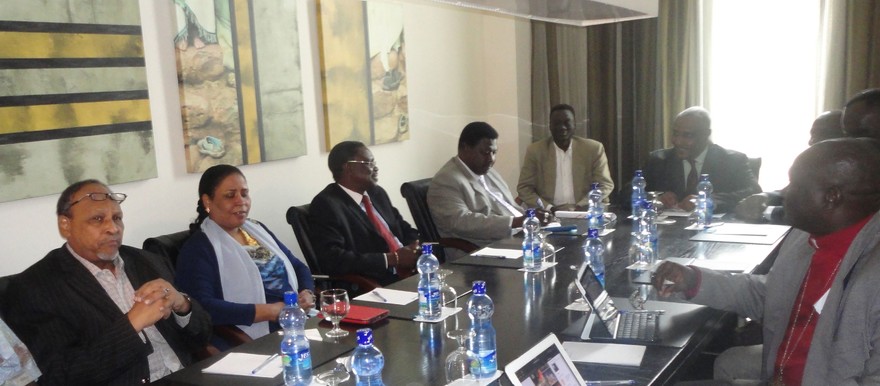Negotiators of the Sudanese government and Sudan People’s Liberation Movement-North disagreed on the agenda and committee arrangements for talks that started this week in Addis Ababa under the mediation of the African Union.
SPLM-N, which controls parts of South Kordofan and Blue Nile states, has been fighting the Khartoum government since 2011. The party’s stated aims include toppling the ruling National Congress Party and transforming Sudan into a secular state.
Sudan’s government has resisted entering into talks with SPLM-N on national issues, seeking instead to focus on possibilities for limited power sharing and security arrangements in the two states in which the rebel movement is controlling territory.
On Wednesday at the negotiations in the Ethiopian capital, the chief government negotiator described limited progress in the first days of the talks. Prof. Ibrahim Ghandour announced that the two parties agreed on the agenda for the negotiations – an announcement that proved premature.
Ghandour also stated that both sides agreed in the presence of the African Union mediators to focus on the issues of humanitarian access, security and political arrangements, as well as the upcoming national political reconciliation initiative in Sudan.
On the other hand, the SPLM-N chief negotiator, Yasser Arman, dismissed these claims, noting the mediators have been exerting efforts to bridge the gap between the two parties but did not reach any breakthrough.
Arman accused the ruling National Congress Party of evading the SPLM-N’s demand for a national constitutional dialogue. He also stated that the government delegation sought to avoid discussion of humanitarian access in the Two Areas.
“The government agreed on the political and security committees, but rejected the national constitutional dialogue and humanitarian committee,” he explained.
In a press statement issued on Wednesday, the SPLM-N chief negotiator confirmed that they neither reached any breakthrough nor agreed on the formation of committees.
Arman voiced suspicions also of the ‘national dialogue’ – a political initiative of the Sudanese president that other rebel movement have likewise shunned – preferring instead the idea of a constitutional conference.
“The government must provide a clear explanation about what does it mean by the national dialogue and how political forces would participate in that dialogue,” he was quoted as saying. “The national dialogue will be definitely dominated by the NCP. The SPLM-N will not accept it.”
Direct meetings concluded
Two days of direct talks between the Sudanese warring parties were concluded on Thursday night, without reaching any tangible result. Finding themselves at an impasse, the two sides decided to refer the disputed issues back to the mediation.
Yasser Arman told the press that his delegation had exerted efforts to reach a peace accord, but the two parties were still sticking to their positions.
“We believe in a holistic solution to the problem in the county, while the government is concentrating on the national dialogue which is dominated by the ruling party,” he noted.
Ghandour, the head of the government delegation, likewise after the Thursday meeting acknowledged that both sides failed to agree on the agenda and referred the issue to the mediators.
He defended the government’s position on the political and security discussions as consistent with the UNSC resolution number 2046 and the AU Peace and Security Council resolution.
Meanwhile, Farah Agar, an advisor at the peace talks from the SPLM-N side, told Radio Tamazuj that there were setbacks during the peace negotiations.
When asked about their rejection of the national dialogue initiative, the adviser said the SPLM-N called for a neutral platform for the dialogue: “We proposed the Ethiopian Prime Minister, Haile Mariam Desalegn and the head of the African Union High Implementation Panel, Thabo Mbeki, as well as the UNAMID official, Mohamed Ibn Chambas, to facilitate the national dialogue.”
This proposal would be unacceptable to the Sudanese government; officials have stressed that the dialogue is ‘purely Sudanese,’ and resisted demands for outside facilitation.




